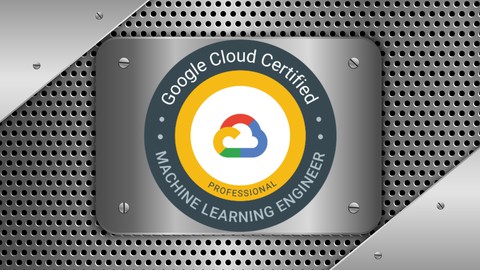Google Professional Machine Learning Engineer Practice Exam.


Price: 19.99$
Google Cloud Professional Machine Learning Engineer is a cutting-edge product designed to provide advanced machine learning solutions to businesses and organizations. This product is specifically tailored to meet the needs of professionals who are looking to develop and deploy machine learning models at scale. With the Google Cloud Professional Machine Learning Engineer, users can leverage the power of Google’s machine learning technology to build and train models that can be used to solve complex business problems. This product is designed to be user-friendly and intuitive, with a range of features and tools that make it easy to get started with machine learning. Users can access a range of pre-built models and templates, as well as a range of tools for data preparation, model training, and deployment. The Google Cloud Professional Machine Learning Engineer also includes a range of advanced features, such as automatic hyperparameter tuning, distributed training, and model explainability. One of the key benefits of the Google Cloud Professional Machine Learning Engineer is its scalability. This product is designed to work seamlessly with Google Cloud, allowing users to scale their machine learning models to meet the needs of their business. With the ability to train and deploy models at scale, businesses can gain a competitive edge by leveraging the power of machine learning to drive innovation and growth. Overall, the Google Cloud Professional Machine Learning Engineer is a powerful and versatile product that is ideal for businesses and organizations looking to harness the power of machine learning. With its advanced features, user-friendly interface, and seamless integration with Google Cloud, this product is the perfect choice for professionals looking to take their machine learning capabilities to the next level. Google Cloud Professional Machine Learning Engineer Certification exam details: Exam Name: Google Professional Machine Learning Engineer Exam Code: GCP-PMLEPrice: $200 USDDuration: 120 minutes Number of Questions 50-60Passing Score: Pass / Fail (Approx 70%)Format: Multiple Choice, Multiple Answer, True/False Google Professional Cloud Security Engineer Exam guide: Section 1: Framing ML problems1.1 Translating business challenges into ML use cases. Considerations include: Choosing the best solution (ML vs. non-ML, custom vs. pre-packaged [e. g., Auto ML, Vision API]) based on the business requirements Defining how the model output should be used to solve the business problem Deciding how incorrect results should be handled Identifying data sources (available vs. ideal)1.2 Defining ML problems. Considerations include: Problem type (e. g., classification, regression, clustering)Outcome of model predictions Input (features) and predicted output format1.3 Defining business success criteria. Considerations include: Alignment of ML success metrics to the business problem Key results Determining when a model is deemed unsuccessful1.4 Identifying risks to feasibility of ML solutions. Considerations include: Assessing and communicating business impact Assessing ML solution readiness Assessing data readiness and potential limitations Aligning with Google’s Responsible AI practices (e. g., different biases)Section 2: Architecting ML solutions2.1 Designing reliable, scalable, and highly available ML solutions. Considerations include: Choosing appropriate ML services for the use case (e. g., Cloud Build, Kubeflow)Component types (e. g., data collection, data management)Exploration/analysis Feature engineering Logging/management Automation Orchestration Monitoring Serving2.2 Choosing appropriate Google Cloud hardware components. Considerations include: Evaluation of compute and accelerator options (e. g., CPU, GPU, TPU, edge devices)2.3 Designing architecture that complies with security concerns across sectors/industries. Considerations include: Building secure ML systems (e. g., protecting against unintentional exploitation of data/model, hacking)Privacy implications of data usage and/or collection (e. g., handling sensitive data such as Personally Identifiable Information [PII] and Protected Health Information [PHI])Section 3: Designing data preparation and processing systems3.1 Exploring data (EDA). Considerations include: Visualization Statistical fundamentals at scale Evaluation of data quality and feasibility Establishing data constraints (e. g., TFDV)3.2 Building data pipelines. Considerations include: Organizing and optimizing training datasets Data validation Handling missing data Handling outliers Data leakage3.3 Creating input features (feature engineering). Considerations include: Ensuring consistent data pre-processing between training and serving Encoding structured data types Feature selection Class imbalance Feature crosses Transformations (Tensor Flow Transform)Section 4: Developing ML models4.1 Building models. Considerations include: Choice of framework and model Modeling techniques given interpretability requirements Transfer learning Data augmentation Semi-supervised learning Model generalization and strategies to handle overfitting and underfitting4.2 Training models. Considerations include: Ingestion of various file types into training (e. g., CSV, JSON, IMG, parquet or databases, Hadoop/Spark)Training a model as a job in different environments Hyperparameter tuning Tracking metrics during training Retraining/redeployment evaluation4.3 Testing models. Considerations include: Unit tests for model training and serving Model performance against baselines, simpler models, and across the time dimension Model explainability on Vertex AI4.4 Scaling model training and serving. Considerations include: Distributed training Scaling prediction service (e. g., Vertex AI Prediction, containerized serving)Section 5: Automating and orchestrating ML pipelines5.1 Designing and implementing training pipelines. Considerations include: Identification of components, parameters, triggers, and compute needs (e. g., Cloud Build, Cloud Run)Orchestration framework (e. g., Kubeflow Pipelines/Vertex AI Pipelines, Cloud Composer/Apache Airflow)Hybrid or multicloud strategies System design with TFX components/Kubeflow DSL5.2 Implementing serving pipelines. Considerations include: Serving (online, batch, caching)Google Cloud serving options Testing for target performance Configuring trigger and pipeline schedules5.3 Tracking and auditing metadata. Considerations include: Organizing and tracking experiments and pipeline runs Hooking into model and dataset versioning Model/dataset lineage Section 6: Monitoring, optimizing, and maintaining ML solutions6.1 Monitoring and troubleshooting ML solutions. Considerations include: Performance and business quality of ML model predictions Logging strategies Establishing continuous evaluation metrics (e. g., evaluation of drift or bias)Understanding Google Cloud permissions model Identification of appropriate retraining policy Common training and serving errors (Tensor Flow)ML model failure and resulting biases6.2 Tuning performance of ML solutions for training and serving in production. Optimization and simplification of input pipeline for training Simplification techniques Google Cloud Professional Machine Learning Engineer Certification Practice Exam Benefits: Google Cloud Professional Machine Learning Engineer Certification Practice Exam is a highly beneficial product for individuals seeking to enhance their proficiency in machine learning engineering. This practice exam is designed to provide candidates with a comprehensive understanding of the concepts and principles of machine learning engineering, as well as the skills and knowledge required to pass the Google Cloud Professional Machine Learning Engineer Certification exam. practice exam is structured to simulate the actual certification exam, providing candidates with an opportunity to familiarize themselves with the exam format, question types, and time constraints. This enables candidates to develop effective exam-taking strategies and build confidence in their ability to pass the certification exam. Google Cloud Professional Machine Learning Engineer Certification Practice Exam is also an excellent resource for individuals seeking to validate their knowledge and skills in machine learning engineering. By successfully passing the practice exam, candidates can demonstrate their proficiency in the field and enhance their credibility as a machine learning engineer. Overall, the Google Cloud Professional Machine Learning Engineer Certification Practice Exam is a valuable tool for individuals seeking to advance their career in machine learning engineering. It provides candidates with the necessary skills and knowledge to pass the certification exam, as well as the confidence and credibility to succeed in the field.






